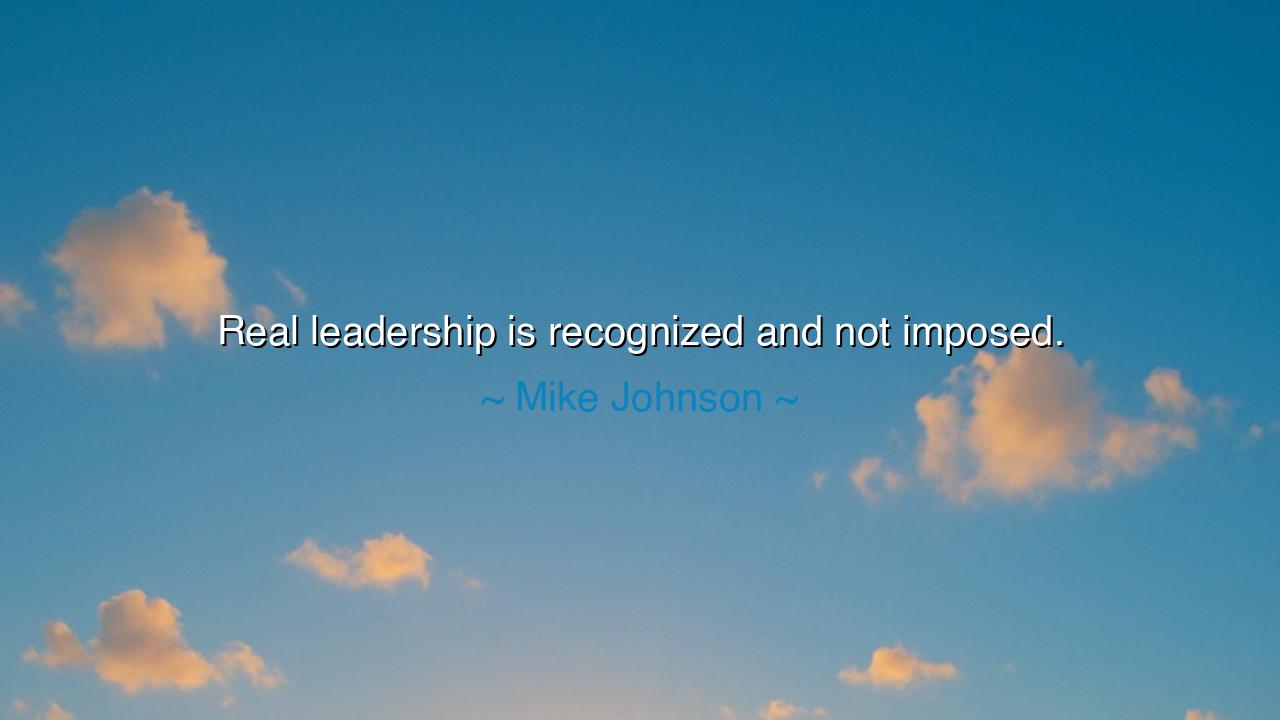
Real leadership is recognized and not imposed.






Hear, O children of the future, the words of Mike Johnson: “Real leadership is recognized and not imposed.” Within this phrase lies a truth both ancient and enduring. For power may be seized by force, titles may be claimed by law, and crowns may be set upon the brow by decree—but true leadership is never born of compulsion. It arises when the hearts of the people themselves acknowledge the one who guides them. A tyrant may command obedience through fear, but a true leader inspires allegiance through trust.
From the beginning of civilizations, men and women have known this difference. When a leader is imposed, the people bow their heads but keep their hearts apart. They obey in body, but not in spirit. Such power crumbles when tested by storm, for it lacks roots in the soil of the people’s will. Yet when a leader is recognized, it is as though the people themselves have chosen to lift that one upon their shoulders. Their trust becomes a fortress, their loyalty a shield, their devotion a flame that no wind can extinguish.
Consider the life of Mahatma Gandhi. He was not born to rule, nor did he seize power by arms. He wore no crown, commanded no army, yet his people saw in him the reflection of their deepest yearning for freedom. His leadership was not declared by law but recognized by millions who followed him willingly. When he called for nonviolent resistance, his words stirred the conscience of a nation. Though the empire against him was vast, his authority was greater, for it rested not upon force but upon the recognition of the people. This is the essence of the truth Mike Johnson spoke: real leadership flows upward from the recognition of the people, not downward from the imposition of rulers.
History is filled with those who failed to grasp this truth. The emperors who crowned themselves, the generals who seized thrones, the dictators who demanded loyalty—all were feared, but not loved; obeyed, but not trusted. Their reigns burned brightly for a season but ended in ashes. Fear can bend the body, but it cannot bind the soul. And when the soul rises, the imposed leader is cast down. Thus, across the ages, we see that recognition is the foundation of endurance, while imposition is the seed of ruin.
Naidu’s words about hollow leadership echo here as well, for the essence of recognition lies in substance. A true leader does not cry, “Follow me!” but acts with such integrity, such courage, that the people whisper, “Here is one we will follow.” Recognition is earned, never forced. It is the silent judgment of the community, the unseen crown placed upon a leader’s head by the will of those who see their heart.
The lesson, therefore, is clear: if you would lead, seek not titles, nor force, nor imposition. Instead, cultivate virtues that draw recognition naturally. Speak truth when silence is easier. Act with justice when compromise is tempting. Bear hardship with courage, and serve not yourself but those around you. Then, even without seeking it, others will look to you as their guide, for they will see in your life the flame of true leadership.
Practical action follows from this wisdom: in your home, in your work, in your community, strive to embody integrity, humility, and service. Do not crave leadership as a prize to seize, but let it come as the natural fruit of your labor and character. Be the one others turn to not because you imposed yourself upon them, but because they recognized in you the spirit of guidance. For only then will your influence endure, only then will your leadership be real, and only then will your legacy remain unshaken by time.
Thus, remember always: real leadership is recognized, not imposed. Seek to be worthy of recognition, and leadership will come to you as the river comes to the sea—naturally, inevitably, and with a power that no force of man can deny.
–––






AAdministratorAdministrator
Welcome, honored guests. Please leave a comment, we will respond soon